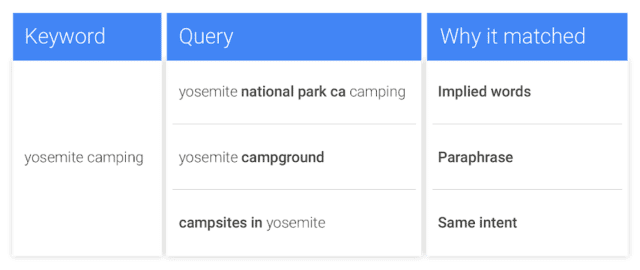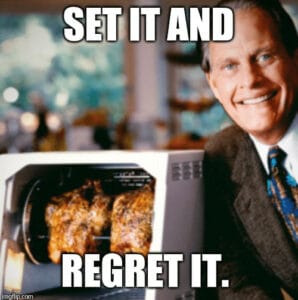
First, what is PPC? When we say PPC at Wellspring Digital, we are talking about any sort of paid search and digital marketing. It could be Google Ads, Bing Ads, Paid Social, Amazon, YouTube, and so on and so forth.
For this article, I am going to focus on some high-level and common mistakes that can happen in any of these campaigns. I will include some handy resources if you want to do a deeper dive.
So, let’s start telling you what not to do…
- Starting your campaign without a clear strategy or goal
- Bad audience and geo-targeting strategy
- Sleeping on Bing and other ad networks
- Not using exact match
- Forgetting about negative keywords
- Slapping together landing pages
- Ignoring the importance of your messaging
- Letting campaigns and budgets go unchecked
OK, let the lecturing begin. Just kidding, but not really…

PPC Campaigns without A Clear Strategy or Goal
Seems simple right, have a strategy. You’d be surprised how many companies will begin a PPC campaign without thinking it all the way through.
I always go back to journey mapping whenever I talk about campaign strategy. Journey mapping is a user experience (UX) term that literally means mapping out the user’s journey, usually when using software, or performing some sort of complex task.
Why not apply this practice to PPC? Start by working backward from your desired goal. This will force you to, well, have a goal, which is a good thing. And it helps you visualize the journey the customer takes before getting there.
I’m going to oversimplify here but you’ll get the picture. Working backward…
- Goal achieved (maybe it’s a purchase or appointment booked or newsletter signup)
- Landing page with offer and signup
- Ad with compelling copy
- Target keywords
- Target geography
- Platform
- Customer need and profile
Again, oversimplifying but you see where I’m going. Think the entire user journey through and you will be less likely to skip anything that might help your campaign to succeed.
Journey mapping will also force you to ask hard questions like “would they click on this ad?” Or “are our goals realistic?”
The user will not take the entire journey unless you’ve really taken the time to think through the entire campaign, making certain that the audience takes action and your goals are achieved.
Bad Audience and Geo-Targeting
If you’re guessing about who your target audience is, you’re already screwed. Sorry. The key to any successful marketing effort is to know your audience as completely and intimately as possible.
Know Your Audience
If you already have a base of great customers and you want to grow that base, you should have all the data you need. But don’t stop at data, take some time and talk to that audience. First, ask them if they would be interested in what you’re pitching.
Ask them what platforms they would use to find you. Ask them what keywords and phrases they might use. When would they search and how would they prefer to interact with the ad, landing page. What emotional triggers would get them to take action?
If you don’t have a baseline of customers or this existing data, do some research. Assemble some focus groups if you have the time and resources. Just don’t guess.
You might not need to go fully down the path of buyer personas to achieve success, but the more you know about your target audience, the better.
Geo-Targeting Your Ads
Most ad networks will allow you to get pretty granular with geo-targeting. Be careful not to get too specific or your audience pool may shrink to a number so small, you’ll have no chance of reaching your goal.
If your geographical target is a smaller area, consider expanding it a little just to be safe. Or maybe you want to target CMOs in Baltimore, MD. You’ve set this up and realize that the audience is pretty limited but you still want to run the ads.
Guess what, you will likely be left with additional budget resources. More money, what fun!
Why not branch out to other networks. Maybe you set up an ad on LinkedIn and have money left in your budget. Try running an additional test campaign on Facebook or Twitter. You might find an untapped gold mine of opportunities.
Conversely, if you do not narrow your geo-target down to a specific location, you might end up targeting areas or even countries which will return zero results. If you can only sell in the US, don’t display ads in other countries.
You will run out of money very quickly and have little to show for it. Maybe you’ll get fired or just a stern warning. Either way, it’s not fun and leaves us all feeling a little uncomfortable.

Sleeping on Bing and Other Less Popular Networks
This one is simple, there is more to search, paid or otherwise, than Google. Bing has a market share of 36.96% among US console users. While that might seem low to some, consider the following…
- On average, Bing users tend to make more and spend more.
- Bing users tend to convert more.
- You’ll have access to the AOL and Yahoo ad networks.
- Bing has a lower cost per click rate.
Bing and its ad networks can be your secret PPC weapon, save you money, and deliver a better conversion rate. Do your homework first. Here’s a great resource from Microsoft to determine if your audience is actually using these networks.
Not Using Exact Match Keywords
This one is a serious budget killer. So, networks like Google and Bing will allow you to cast as wide or narrow a net you’d like based on words and phrases searched.
There are now three main types of keyword match types in Google, here’s a breakdown of match types from WordStream…
- Broad match is the default match type and the one that reaches the widest audience.
- Phrase match is when your ad will only appear when a user searches using your keywords in the exact order you enter them, but there might be other words either before or after that phrase.
- Exact match is the most restrictive and exact keyword match. However, Google has recently made changes to the exact match type so that even when using exact match keywords, your ads might match to searches containing synonyms, plurals, or other variations on your keyword.
That update, in my opinion, and the opinions of others like PPC expert Jonathan Kagan, makes exact match the most ideal match type for the majority of paid campaigns.
You will avoid wasteful spending on keywords and phrases that do not apply to your campaign goals but still cast a wide enough net to hit your target. Here’s a great exact match scenario from WordStream…

You can see that even though it’s an “exact match,” Google will still use implied words, paraphrase, and intent when listing your ads. So, it makes perfect sense to use exact-match for your campaigns.
Unless of course, you have endless amounts of money. If so, give me a call. I really would like a new pool and would be happy to slap your logo on the liner.
Not Using Negative Keywords
I wrote an entire post about the importance of negative keywords in ad campaigns. You can get a more complete understanding of the concept there. I think this example from that post will make the point enough here…
Let’s say you sell tax preparation services. So maybe you bid on the term “tax preparation.” But someone searches for “tax preparation software.” That one additional word changes the meaning and, therefore, the user intent of that search.
So, if you offer tax preparation, you would want to list “software” as a negative keyword. Some PPC practitioners will argue that negative keywords are the most important match type.
They can certainly help optimize your campaign for budget and potential results and they’re super easy to set up. Here is a great article on potential negative keywords to consider.
Slapping Landing Pages Together
Landing pages are so important to the success of PPC campaigns, and yet they never seem to get the attention they deserve. I wrote a nice long and I’d like to think, helpful, post about the importance of landing pages for PPC campaigns.
Here’s a summary of the most commons mistakes marketers make with landing pages…
- Adding too many distractions.
- Failing to identify the landing page’s purpose.
- Making the page too complicated. This could be a form with too many fields or building the page with unnecessary code like JavaScript. Make it as simple and fast loading as possible.
- Not tracking activity on the page itself. What are people doing on the page? Hotjar & Crazy Egg are heat mapping tools to visually see how people engage with your landing pages.
- Not running A|B Tests. Optimizely is a great tool for this.
- Not placing the right tracking scripts on your landing page, such as Google Analytics using UTM code URLs.
The only thing I would add here is a tip that Jon Kagan offers in his PPC don’t list. It’s really kind of genius. His suggestion was to consider setting up evergreen landing pages that you can use for campaigns but will also, over time, actually rank in search.
This may not always make sense but when it does, make sure SEO is part of your SEM efforts.
Ignoring the Importance of Your Messaging
How often have you seen an ad with horrible copy? Or you went to a landing page and were overwhelmed, confused, or bored to tears?
There’s a reason why Mad Men was such a great show, well, aside from the drinking, sex, and horrible human behavior…

No one does words like Mr. Don Draper. Words matter, even in ads. The content in your ads and landing pages needs to be on-brand, speak directly to your target audience, and get them to click.
So, no, you don’t need a lot of words, but the words you use are super important. If you have the budget for it, and even if you don’t, I would recommend hiring a writer who specializes in this type of content.
If you cannot afford a writer or cannot justify it to your boss, you still want to allocate the time, energy, team, and attention to the ad content. Run that content by your team and a test audience to compare against campaign goals and audience description.
It’s so important that even changing a word or phrase could affect the success of the campaign. Consider running some A|B testing with small but strategic changes to words or phrases on the ad and landing pages.
Search Engine Journal has a great overview for writing irresistible PPC ad copy.
Letting Campaigns and Budgets Go Unchecked
And finally, set it and forget it only works with rotisserie (spelled right on the first try) chicken.

A neglected PPC campaign can result in any or all of the following…
- Little to no conversions
- Going over budget
- Running out of budget prematurely
- Showing for the wrong searches
And the list could go on. I’m amazed that anyone would even consider letting a campaign run unchecked. A successful campaign requires regular monitoring…
- Are you getting the results you want?
- Can you adjust the ads based on performance to increase effectiveness (usually the answer is yes)?
- Are you missing negative keywords?
A PPC badass is someone who will check in on their campaigns regularly, making adjustments and fine-tuning to continue improving on successes and learning from failures.
Are your campaigns neglected or do you need help getting started? We can help!